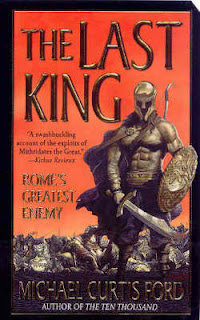 At this point in the grand scale of history, the Swedish Vikings were known as the Varangians, or the Rus. The Rus were well represented well in a personal favorite of mine, The 13th Warrior, a film starring Antonio Banderas in which an Arab comes across a band of Varangian Vikings in his travels along the Volga River in Russia. The film was first found in book form, called The Eaters of Dead by Michael Crichton, which I have heard is the better of the book/film comparison. The Arab and the Vikings, simply called Northmen in the film, travel back to their native Sweden to combat a terrifying force of cavemen/cannibals/bearskin headdress-wearing primitives called the Wendol, pronounced Vendol. The book was inspired by the real-life chronicles of Ahmed Ibn Fadlan, who Antonio Banderas portrays in the film. His observations of a Varagian funeral were recorded and used in both the book and film versions of the story. Fadlan's observations on the funeral even inspired 19th century artist Heinrich Siemiradski to paint Funeral of a Varangian Chieftan, with nearly every element that the Arab described fully represented.
At this point in the grand scale of history, the Swedish Vikings were known as the Varangians, or the Rus. The Rus were well represented well in a personal favorite of mine, The 13th Warrior, a film starring Antonio Banderas in which an Arab comes across a band of Varangian Vikings in his travels along the Volga River in Russia. The film was first found in book form, called The Eaters of Dead by Michael Crichton, which I have heard is the better of the book/film comparison. The Arab and the Vikings, simply called Northmen in the film, travel back to their native Sweden to combat a terrifying force of cavemen/cannibals/bearskin headdress-wearing primitives called the Wendol, pronounced Vendol. The book was inspired by the real-life chronicles of Ahmed Ibn Fadlan, who Antonio Banderas portrays in the film. His observations of a Varagian funeral were recorded and used in both the book and film versions of the story. Fadlan's observations on the funeral even inspired 19th century artist Heinrich Siemiradski to paint Funeral of a Varangian Chieftan, with nearly every element that the Arab described fully represented.In the 9th century AD, Rurik, a Swedish Viking chieftan who along with his brothers and family and personal bodyguards, sailed to the Russian and Ukranian lands by way of the Volga River and saw to it that the more primitive tribes occupying the area were made to be subservient. Not sure if they referred to themselves as such, but they were known to history as the Rus. The Swedish chieftan founded the Rurik dynasty, the Rus, and his son, Oleg, later moved their capital from Novgorod to Kiev, founding the people and principality of the Kievan Rus. Kiev is undoubtedly the capital of the Ukraine, and the word Rus eventually morphed into the Russians - the people of Rus. Under Rurik and Oleg, the Rus found trade and blood with neighboring tribes and with the powerful Byzantine Empire. They eventually fell under the hefty weight of the Mongols, led by Chinggis Qan and all his subsequent successors.
Before Alexander Nevsky and the Mongols got to the Kievan Rus, the Swedish dynasty had ruled in Eastern Europe for several centuries. There are a lot of Russian and Ukranian people with light blond hair, and seeing as how the Rus came to make their presence felt in that part of the world, it's no wonder. As my university offers no graduate programs in the Classics, I have shifted my higher education toward medieval studies. For some time, I had thought I would make my main area of focus the Byzantine Empire, but my interest in the Vikings has risen significantly now that I know that my ancestors, the Rus, the Varangians, the Swedish Vikings, came over to make their lasting mark on the lands of Eastern Europe.






